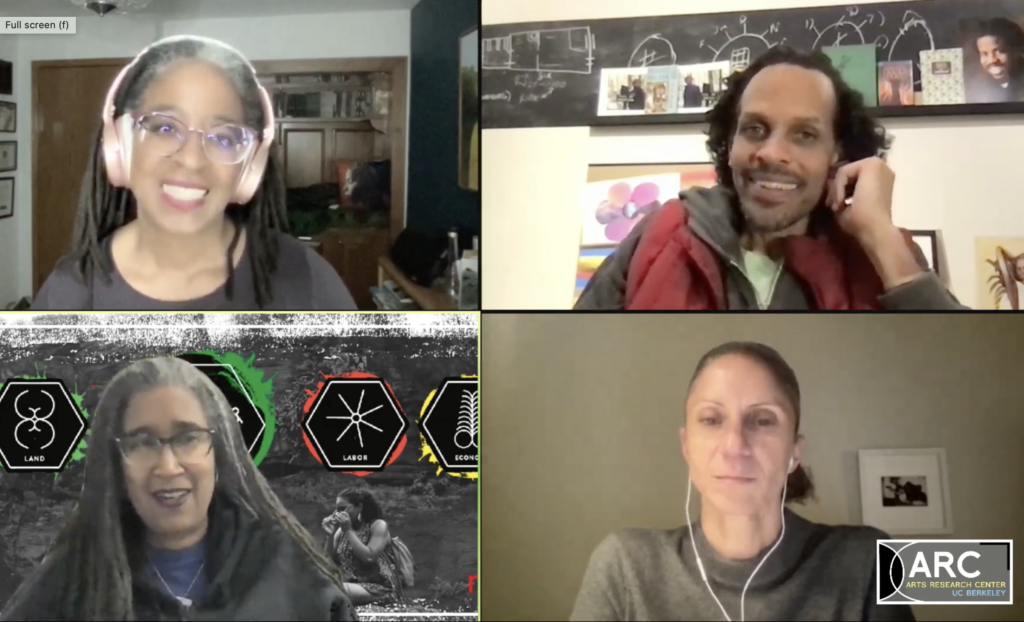by Menat Allah El Attma, February 14, 2022
Camille Dungy & Ross Gay: Black Nature, Poetry, & Coexistence, in conversation with Aya de León and Maurya Kerr (event info here), held on Oct 20, 2021. The full recording of the event is available for viewing on our YouTube channel, here.
The imagination can accommodate whoever might come along.
The page is as much a technology as it is a dream. And a medicine. And a communion. And, also. Camille T. Dungy reminds us of a June Jordan lesson on the important utterance of these two words. To say: this is true, and also…

The page is repair. It is a site for the reparations we are owed—and choose to give ourselves, our people and to give generously. We write on the page to ritualize repair and hold each other in possibility. “After Katrina, it would have been unacceptable,” Aya de León notes on the mattering of Black lives in the climate crisis today. And also, the page is a body. In the absence of the body, writing becomes the body. The page is a place, a memory, a language, a people, an emotional geography—it holds and is held, like a body. We compose a page of members or appendages to make a whole. These figurative surgeries engage with intersectional identity markers including race, class, gender, and gender expression to challenge the extraction of life itself.
Dungy’s remarks at the center of ecological crisis are intensely deep anti-Blackness, misogyny, anti-indigenous, and “we keep going. We keep listing anti-ness. And at the final end, it’s anti-life. It is anti- anything that will value life, connection, and interconnection. We must remember to hold so many brothers and sisters in crisis, and nonhuman lives that are touched by this crisis. Who is the actor here and for what purpose?” The posits of and are key to understanding how these complexities co-inhabit daily. The actor, as Dungy names, has an appetite for corporeal (dis)possession and ecological dominion. The body and Earth are not truly separate. White supremacy maintains a desire to perpetuate the myth of the separation of Black people from Nature and natural belonging. Gay adds how the destruction of the Earth by this very actor has different resonances for different people today, but all can be retraced. The origin point for this ecological crisis was the transatlantic trade of people. “Not only that but of that, in a way, was the beginning of the end of the world.” And also, we must look at the now.
Now offers us a page to write. Some may write “I was here, they wanted to tell us.” And from that page, a hand stretches to hold us. We begin to hold a page closer once we feel its personhood, its neighborhood—all the people (co)existing there, together. The labor of a writer is to expand access and, Dungy declares, “our ability to imagine ourselves in particular ways and spaces. The imagination can accommodate whoever might come along.” If the page is a terrain for holding, writing wills the giving and receiving of ourselves and each other. The page is a testimony, a practice of the personal and communal. In the programming of the page, we commit to a pedagogy of love where we are holding one another in the midst of our changing. Ultimately, what we love will keep us alive.
Image: 1st row, l to r – Camille Dungy and Ross Gay; 2nd row – Aya de León and Maurya Kerr.
Menat Allah El Attma is an Egyptian Muslim woman, educator, writer, and visual artist. Menat graduated from UC Berkeley with a BA in English literature and is pursuing her teaching credential. She is a logophile and linguaphile, working to affect a similar love for words/languages in her students through the practice and art of storytelling. She believes art is in the telling of the story as much as the story itself. Menat was a 2020 ARC Poetry & the Senses fellow.
